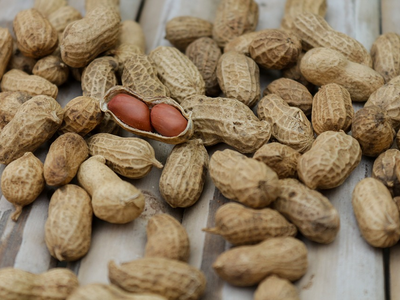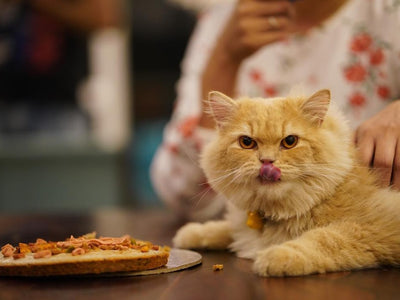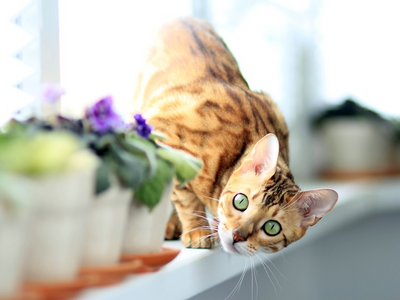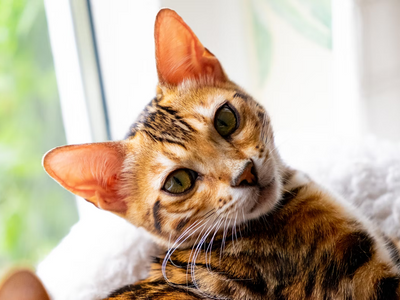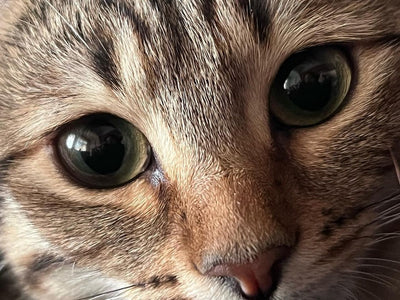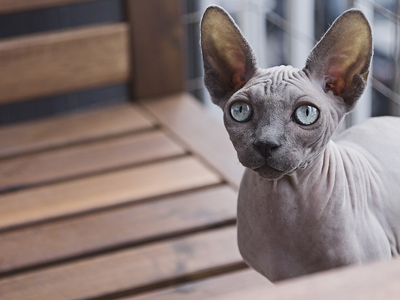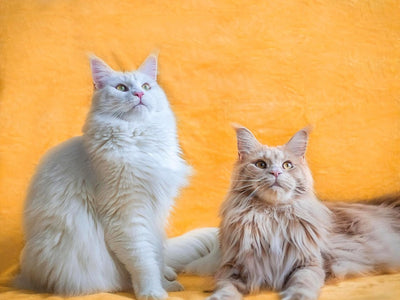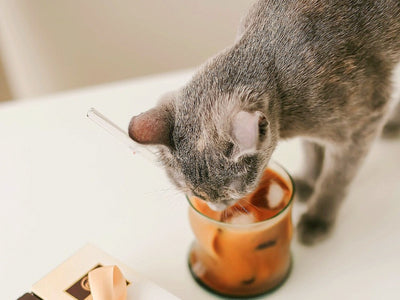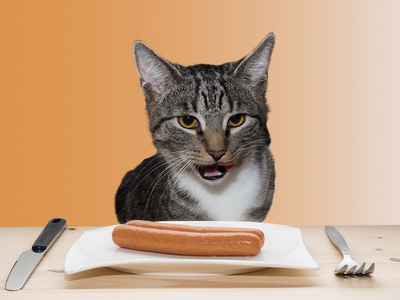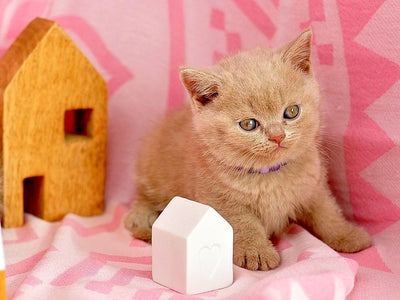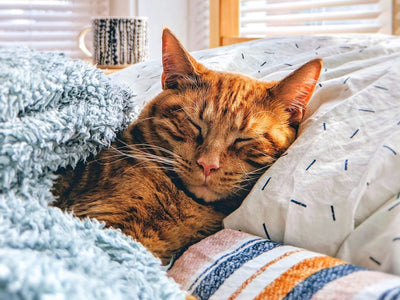01.02.2022
Can cats eat peanut butter, or should they avoid this human treat?
You left your peanut butter sandwich unattended only to realise that your cat got their paws on it. While your feline most likely enjoyed the taste, you probably asked yourself, “can cats eat peanut butter?” If you aren’t sure about what cats can eat, we will help you navigate the complex world of cat nutrition.
We will clarify the following:
- Which peanut butter is safe for cats
- What alternative products you can get
- What not to give to your kitty
- The basics of an appropriate feline diet

Peanuts are an excellent treat for humans, but are they safe for your furball?
Source: Vladislav Nikonov
Is it safe for cats to eat peanut butter?
To answer the question of whether peanut butter is safe for feline consumption, we’ll go over the following:
- Nutritional value of peanut butter
- Problematic ingredients
- Risks of feeding peanut butter to your furry friend
Nutritional value of peanut butter
Peanut butter is a balanced energy source for cat parents, and it contains three major macronutrients—carbs, protein, and fat. The following table shows the nutritional value of peanut butter per 100 grammes:
|
Macronutrient |
Amount in grammes |
Percentage of calories |
|
Carbohydrates |
22 grammes |
14% |
|
Protein |
22.5 grammes |
14% |
|
Fat |
51 grammes |
72% |
Peanut butter doesn't contain the nutrients your cat needs in their diet. As they are obligate carnivores, cats evolved to eat and digest meat, so other food types will not sit well with them.
Feeding peanut butter to your furry companion is not dangerous but only if given in small amounts and occasionally because it’s high in calories.
Peanut butter can come in handy when you must give medication to your kitty. You can trick your furry friend by placing a pill inside a small serving of peanut butter, provided they like the taste.
Problematic ingredients in peanut butter
If you decide to treat your furball to some peanut butter, you must check the ingredients list on the packaging. The product isn’t safe for your kitty if it contains any of the following:
- Salt—Too much salt can be dangerous for cats as it can cause nausea, vomiting, diarrhoea, dehydration, cystitis, and bladder stones. Peanuts don’t contain salt, but it is often added to the final product
- Xylitol—Many peanut butter manufacturers use an artificial sweetener called xylitol as a sugar replacement because it’s low in carbs. It can be highly toxic or even fatal for cats. The signs of xylitol poisoning include vomiting, drooling, lethargy, inability to maintain balance, and seizures. If your cat exhibits any signs of xylitol poisoning, take them to the vet immediately
- Fat—Peanuts contain high amounts of fat, which cats can't metabolise. Unlike the fatty acids in meat, which are beneficial for felines, vegetable fats may cause gastrointestinal issues
Risks of feeding peanut butter to your furry friend
Giving peanut butter to your cat comes with various risks. Consider the following when giving this popular treat to your feline companion:
- Allergies—Nut allergies are not uncommon in felines (macadamia is even poisonous). You can check whether your cat is allergic to peanuts by giving them a small amount of peanut butter and monitoring them for hives, itching, swelling, and vomiting. If your cat has an allergic reaction to peanuts, take them to the vet immediately
- Choking hazard—Peanut butter has a sticky and thick texture, so it may get stuck to your cat’s throat, creating a lump, which can cause breathing difficulties
- Gastrointestinal distress—Cats with sensitive stomachs will not be able to break down the components of peanut butter, which can cause gastrointestinal problems. The signs of GI distress are gas, diarrhoea, vomiting, and stomach upsets
- Aflatoxins—Aflatoxin is often present in different nuts or maize and can lead to liver disease and cancer
- Weight gain and diabetes—A tablespoon of peanut butter has almost 100 calories, which is way above your cat's daily needs. Frequent consumption may lead to obesity and diabetes
Most importantly, felines cannot get the essential nutrients from peanut butter because their digestive tracts are designed to process only meat. Although it works as an occasional treat, you shouldn't offer this product to your cat regularly.

I want it soooo bad, hooman! Can I have a taste, pretty please?
Source: cat1ncat2
Can cats eat peanut butter and jelly?
Peanut butter and jelly sandwiches are super tasty to cat parents, so they might be inclined to share some with their furry friend. Unfortunately, this treat is not the best option for your cat. We've already discussed peanut butter, so let's examine the pros and cons of the remaining ingredients:
- Jelly
- Bread
Jelly
Jelly is not toxic to cats in moderation, but it can cause digestive problems because of the sugar content. Eating too much sugar may lead to vomiting, diarrhoea, and general discomfort. What's even worse, cats cannot taste sweet but can develop serious health issues, such as diabetes, pancreatitis, liver disease, or gallbladder disease. Feline obesity is also linked to carb overconsumption.
Steer clear of grape jelly as grapes are toxic to cats and can cause:
- Vomiting
- Diarrhoea
- Abdominal pain
- Loss of appetite
- Dehydration
- Death due to kidney failure
Bread
Bread doesn’t have a nutritional profile suitable for your cat's digestive system. As a source of empty calories, it can cause obesity in indoor cats (especially neutered) if fed regularly.
Grain does not add any nutritional value to your cat’s diet because obligate carnivores cannot process plant proteins or fibre properly.
Yeast ferments in the feline tummy and turns into ethanol, which is highly toxic. Baked pastry is not a cause for concern in this respect due to heat processing, but the raw dough should be off-limits to your cat.
How to find suitable peanut butter for your cat
If your cat’s favourite treat is peanut butter, you can feed it from time to time but make sure that the product is 100% peanuts, including the oil content. If the label lists any of the following, don't give it to your feline:
- Sugar—Sugar is useless to your cat and may even lead to diabetes and obesity
- Sodium—Sodium puts your cat at risk of high blood pressure and heart disease
- Trans fats—Trans fats may often cause heart failure and type 2 diabetes in felines
- Chemical preservatives—Peanut butter may contain sodium benzoate, which can cause poisoning in cats
- Other nuts—Peanuts are generally safe for cats, but peanut butter may sometimes contain other nuts, such as pecans, walnuts, and macadamia, which are poisonous to your kitty
- Artificial sweeteners—Artificial sweeteners, especially xylitol, may be toxic to felines

Fruits to me are like chocolate to you! Lemme have some now!
Source: jejejimmy
Safer treats
Meat treats are the safest and healthiest option for your cat. If you still want to share some food with your furry friend as a way of bonding, stick to the following:
- Spinach
- Eggs (only boiled and in the tiniest amounts)
- Cantaloupe
- Bananas
- Pumpkin
- Apples
- Blueberries
- Strawberries
- Carrots
- Rice
Keep in mind that cats lack the enzymes needed to process and absorb nutrients from plants. Although felines can chew grass sporadically to get some fibre, a vegan diet will not help them thrive and stay healthy.

Chocolate is highly toxic to your furry friend, so make sure to keep them away from it.
Source: cocsa_cat_2018
Is there anything else cats should avoid?
Your cat should never eat:
- Chocolate—Cocoa and caffeine are toxic to felines. Cocoa contains caffeine and can make your cat hyperactive. It can also lead to tremors, seizures, vomiting, and diarrhoea
- Milk and cheese—Most cats are lactose intolerant, so dairy products will typically cause gastrointestinal issues
- Alcohol—The tiniest amounts can cause liver failure in cats
- Allium vegetables—Garlic, onions, chives, and other allium veggies destroy your cat's red blood cells
- Dough and food containing raw yeast—Yeast causes bloating and gastrointestinal discomfort. If it ferments in your kitty's tummy, it can turn into alcohol which causes liver failure and death
If your cat eats any of these products, you should take them to the vet immediately.

Meat should be the number one choice in your feline companion’s diet because they get all the necessary nutrients from it!
Image (c) Untamed
What should cats eat if peanut butter is not suitable for them?
When tailoring a meal plan for your cat, you should make sure that their diet follows feline natural feeding habits and nutritional needs.
Cats thrive on animal protein and fat, so their diets should consist of whole meat. It is the only viable source of necessary amino acids, such as taurine and arginine. Taurine is essential for your cat’s heart and eyesight function and reproductive health.
The best sources of protein for cats are:
- Poultry
- Red meat
- Fish
Poultry
Chicken, turkey, and duck are excellent protein sources, especially thigh and breast meat. Duck contains more fat, so it should be served from time to time or as a taste enhancer.
It is not advised to feed your cat raw chicken, turkey, or duck as the meat may contain pathogens like salmonella and listeria.
Red meat
When it comes to red meat, your cat can eat:
- Beef—Keep in mind that beef is a common allergen, so give your cat a small amount to eliminate the risk of severe allergic reactions
- Pork—Pork is not a bad option, but it is rich in fat so give it in moderation or as a taste booster. You should avoid bacon and other cured products because they are high in sodium and may contain sulfites. Ham is a better option, but use it in moderation
Fish
Fish is great for cats because it is packed with essential nutrients. You should avoid fish that contains mercury, cadmium, and other metals and toxins. Stick to tuna, salmon, sardines, and mackerel. Seafood like prawns and shrimp is also excellent for your cat’s health.

Even though wild kitties eat their meat raw, it doesn’t mean that your indoor furball should!
Image (c) Untamed
What about raw meat?
Domesticated cats don’t hunt their food, bar an occasional mouse or insect, so they don’t have access to fresh prey. Raw food from the human food supply chain is not suitable for your kitty because it undergoes freezing and defrosting, which makes it susceptible to pathogens, including listeria, salmonella, and E coli. Refrain from giving raw chicken or any B.A.R.F. treats to your cat to avoid bacterial infection and cross-contamination.
Is dry food a good option?
Dry food might seem like a good idea because it’s affordable and easy to store and serve, but a diet based on cat kibble isn’t enough for your furry companion. These products are usually heavily processed and lack moisture. Wet food is the superior alternative, typically containing all the essential ingredients and adequate moisture content.
Some vets claim that dry cat food might help with your kitty’s dental health. You can mix dry and wet food or add some soup or broth to the kibble.
Why wet food is the most optimal for your cat’s diet
Feline nutritionists and vets stress the superiority of wet over dry cat food. They concluded that cats who eat wet food have fewer health problems. Gravy and jelly cat products typically contain more appropriate nutrients contributing to cats’ overall well-being, and the high moisture content helps cats stay hydrated.
Here are some health benefits of wet food:
- Better digestion and stronger immune response
- Effortless weight control
- Better heart and eyesight function
Most kitties will enjoy wet food because:
- They find it easier to chew and swallow
- It has an alluring aroma
- Its taste is enticing to felines
- It provides the right amount of calories, making cats more energetic throughout the day

Sniff sniff, what is this? I like its smell, it must be yummy!
Image (c) Untamed
Let your cat go Untamed, and they’ll forget about peanut butter
Our recipes with jelly and gravy contain the best human-grade ingredients. Untamed never uses meat derivatives, grain fillers, and vegetables because we are dedicated cat parents, and we know how important meat proteins, fats, and vitamins are for your furball’s health.
Untamed is suitable for cats of all breeds. Persian, Siamese, Bengal, Maine Coon, Ragdoll, and British Shorthair cats all thrive on our meals regardless of whether they’re kittens, adults, or seniors. Even if your kitty goes through a special phase in their life, including pregnancy, loss of teeth, or recuperation after an illness, Untamed is an excellent solution for them.
All our products are:
- Filled with protein (our food contains twice as much protein as the industry standard)
- Hypoallergenic and designed in cooperation with vets for optimal nutritional value and homemade taste
- Carefully simmered to preserve all nutrients
- Produced according to the highest ethical standards
- In 100% recyclable packaging
Even if you have a picky cat who doesn’t want to eat wet food, Untamed’s savoury dishes will make them ask for more.
To get some Untamed for your furry friend, take our TRY NOW quiz and tell us about your cat eating habits to get a tailor-made meal plan at the best price.
Check out some of our tastiest recipes here:
- Chocka Chicken in Gravy—Created from hand-shredded chicken and simmered in gravy, this dish is perfect for kitties who like poultry
- Chocka Chicken in Jelly—Lighter but equally delicious, Chocka Chicken in Jelly will blow your cat’s mind. It is perfect for kitties with sensitive stomachs
How to get your first taster pack
Untamed runs a smooth online ordering system for cat food. Getting your first starter pack is a total cakewalk:
- Tell us all about your furry friend
- Pick a meal plan
- Place your order
We will send it your way within a day. If your furry companion likes our food, we will replenish your stock around the same time each month. You can pause, cancel, or modify your order whenever you want.

One week on Untamed, and you’ll notice improvements in your kitty’s litter box!
Image (c) Untamed
Untamed makes your cat feel better in one week
Need more reasons to get our monthly subscription for fresh cat food? Here’s what our loyal and satisfied clients said about the Untamed effect:
|
Period on Untamed |
The effect |
|
Seven days |
|
|
Two months |
|
|
Half a year and beyond |
|
Check out our other guides to what cats can or cannot eat:
|
|

![Associated image for What human food can Sphynx cats eat? [Comprehensive list]](http://untamed.com/cdn/shop/articles/what_human_food_can_sphynx_cats_eat_Featured_400x300_crop_center.jpg?v=1648705074)
